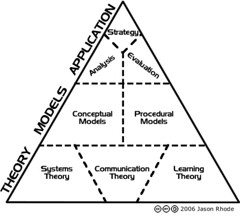 Image via WikipediaI have watched instructional designers from top-notch universities loaded down with the latest theories completely flounder when faced with the realities of the work. With instructional designers, I look for two things: a portfolio and any teaching/tutoring experience. I am not looking for a 3-d, animated Flash portfolio of Whizbang 2.0 - I am looking for a collection of problems that were solved through design, technical skill, or direct application of pedagogy. You will need some models for teaching and learning. Be prepared to talk about the strengths and weaknesses of any of them. I am not looking for ideologues, but folks that understand that models can be useful (a model is just a model though). Since instruction is about learning, we need a common language for how we describe how teaching and learning happens. A lot of this can be had in a traditional university but much of it comes through practice. If you are studying instructional design and want that kind of practice, there are numerous opportunities:
Image via WikipediaI have watched instructional designers from top-notch universities loaded down with the latest theories completely flounder when faced with the realities of the work. With instructional designers, I look for two things: a portfolio and any teaching/tutoring experience. I am not looking for a 3-d, animated Flash portfolio of Whizbang 2.0 - I am looking for a collection of problems that were solved through design, technical skill, or direct application of pedagogy. You will need some models for teaching and learning. Be prepared to talk about the strengths and weaknesses of any of them. I am not looking for ideologues, but folks that understand that models can be useful (a model is just a model though). Since instruction is about learning, we need a common language for how we describe how teaching and learning happens. A lot of this can be had in a traditional university but much of it comes through practice. If you are studying instructional design and want that kind of practice, there are numerous opportunities:- facilitate courses through your local community colleges,
- volunteer (or get paid) as a tutor,
- join a literacy project and teach people how to read,
- work as a teaching assistant in your dept.,
- substitute teach,
- facilitate online trainings in a professional organization.
 Image by jrhode via FlickrThere are many more such opportunities. The way to make the most of those opportunities is to ask questions, observe, keep a journal on what happens, read the professional literature in tutoring, education, and teaching for your discipline.
Image by jrhode via FlickrThere are many more such opportunities. The way to make the most of those opportunities is to ask questions, observe, keep a journal on what happens, read the professional literature in tutoring, education, and teaching for your discipline.It is a lot to ask, especially for new graduates. Have of what is worth knowing about teaching and learning comes from program specific classes and the other half through a broad self-education. We need more people from the humanities in instructional design. There are problems that come up in ID that are seemingly insoluble to some yet are obvious to someone reads history or art. There are ideas floating around instructional design that would have little credence with an even casual acquaintance with philosophy or psychology would clear up. One has to ask why ID degrees have so little psychology in them when how we learn seems to be the central issue of the discipline!
 Image via WikipediaBut all of this will only take you so far. It is unreasonable in every sense of the word to expect new graduates to have a broad education, fearless in the face of technology, and facility with theory. What is most important is the networks in which you are participating in. If you don't know the answer, how do you find out? Are you on Facebook, Twitter, or Plurk? Who are the most helpful people in your networks? Where are your most important connections? Are you taking online classes? What blogs do you read? What blogs do you comment on? How vital are your networks? How have your connections shaped your growth as a learner? I don't believe that one person can have all the answers, but one well connected person can come close enough.
Image via WikipediaBut all of this will only take you so far. It is unreasonable in every sense of the word to expect new graduates to have a broad education, fearless in the face of technology, and facility with theory. What is most important is the networks in which you are participating in. If you don't know the answer, how do you find out? Are you on Facebook, Twitter, or Plurk? Who are the most helpful people in your networks? Where are your most important connections? Are you taking online classes? What blogs do you read? What blogs do you comment on? How vital are your networks? How have your connections shaped your growth as a learner? I don't believe that one person can have all the answers, but one well connected person can come close enough.What tools do you consider essential for instructional designers? Feel free to add a comment below. I also have a collection of tools that we are playing with here at College of the Redwoods.

No comments:
Post a Comment